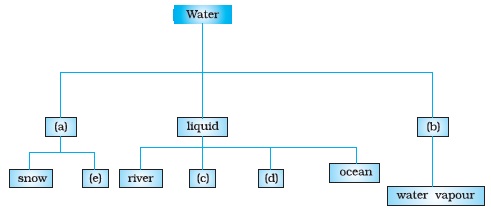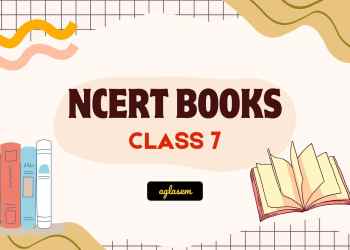Class 7 Important Questions for Science – Water : A Precious Resource
NCERT Exemplar Class 7 Science is very important resource for students preparing for VII Board Examination. Here we have provided NCERT Exemplar Problems Solutions along with NCERT Exemplar Problems Class 7.
Question from very important topics are covered by NCERT Exemplar Class 7. You also get idea about the type of questions and method to answer in your Class 7th examination.
Here you can get Class 7 Important Questions Science based on NCERT Text book for Class VII. Science Class 7 Important Questions are very helpful to score high marks in board exams. Here we have covered Important Questions on Water : A Precious Resource for Class 7 Science subject.
Science Important Questions Class 7 are given below.
Multiple Choice Questions
- Which of the following does not show water shortage?
- (a) Taps running dry.
- (b) Long queues for getting water.
- (c) Marches and protests for demand of water.
- (d) A family gets three buckets of water per person per day.
- Seas and oceans are full of water on earth. However, a very small percentage of water present on earth is available for us.
This percentage is roughly- (a) 0.006%.
- (b) 0.06%.
- (c) 0.6%.
- (d) 6%.
- Which of the following are not the liquid forms of water?
(i) Snow
(ii) Lake water
(iii) River water
(iv) Water vapour
(v) Ice
Choose the correct combination from the options below.- (a) (i), (iv) and (v)
- (b) (i) and (ii)
- (c) (ii) and (iii)
- (d) (iv) only
- A man digging the ground near a water body found that the soil was moist. As he kept digging deeper and deeper he reached a level where all the spaces between particles of soil and gaps between rocks were filled with water. The upper limit of this layer is called
- (a) water level.
- (b) water table.
- (c) ground water.
- (d) water limit.
- Which of the following is a way to use water economically?
- (a) Construction of bawris
- (b) Rainwater harvesting
- (c) Drip irrigation
- (d) Infiltration
- On which of the following day is World Water Day observed?
- (a) 22 March
- (b) 14 November
- (c) 2 October
- (d) 21 December
- The amount of water recommended by the United Nations for drinking, washing, cooking and maintaining proper hygiene per person per day is a minimum of
- (a) 5 litres
- (b) 15 litres
- (c) 30 litres
- (d) 50 litres
- “Every Drop Counts” is a slogan related to
- (a) counting of drops of any liquid.
- (b) counting of water drops.
- (c) importance of water.
- (d) importance of counting.
- Water cycle does not involve which of the following?
- (a) Evaporation
- (b) Condensation
- (c) Formation of clouds
- (d) Rainwater harvesting
- Which of the following inhibits the seepage of rainwater into ground?
- (a) A pukka floor
- (b) Playground
- (c) Grass lawn
- (d) Forest land
Very Short Answer Type Questions
- State whether the following statements are True or False. If false, write the correct statement.
- (a) Water vapour is the gaseous form of water.
- (b) Ice is solid whereas snow is the semi-solid form of water.
- (c) Ocean water cannot be used for domestic purposes.
- (d) Rapid growth of industries is one of the causes for water shortage.
- Some definitions are given below which can be corrected by changing one word. Correct them.
- (a) Aquifer is ground water stored between layers of hard rock above the water table.
- (b) The process of evaporation of water in the ground is called infiltration.
- (c) The evaporation of water from oceans and its arrival back into oceans is called vapour cycle.
- What is the source of water in each of the following ?
- (a) Wells
- (b) Ground
- (c) Atmosphere
- State whether the following statements are True or False. If false, give the correct statement.
- (a) The process of seeping of water into ground is called filtration.
- (b) 51% of the earth’s surface is covered with water.
- (c) Year 2003 was observed as the International Year of Freshwater.
- (d) Snow and ice both are solid forms of water.
Short Answer Type Questions
- Fill in the blanks in the given passage.
The rainwater and ________________ from other sources such as rivers and ponds seeps through the ______________ and fills the empty spaces and cracks deep below the ground. The process of seeping of water into the ground is called ______________. - Fill in the blanks and complete the story selecting words from the box given here.
cold, demand, leaders, dry, hot, scarcity, workers, wet, oceans, harvesting, rivers
Rajasthan is a _________ and dry place. The challenge of natural _______ of water was met by a successful experiment. A band of social ________ had transformed a _________ area into a green place. They have revived five dried-up ________ by constructing water ___________ structures. - Place the following statements in a proper order to form a meaningful paragraph.
- (a) Which in turn decreases the seepage of rain water into the ground.
- (b) This decreases the open areas like park, and playgrounds.
- (c) Increasing population create demand for construction of houses, shops, offices, roads and pavements.
- (d) This results in depletion of water table and creates scarcity of more water.
- How can you observe the three forms of water in (i) nature and (ii) at home?
- Complete the given table

- Match Column I with Column II

- A list of jumbled words are given here. Write the correct form of each word.
- (a) WASHFERRET
- (b) CHARREGE
- (c) QUIFERA
- (d) WOSN
- From where do the following usually get water? In which form is water present in them?
- (a) Clouds
- (b) Plants
- (c) Mountain tops
- (d) Aquifer
- (e) Animals
Long Answer Type Questions
- Complete the following chart by writing appropriate words in the boxes marked (a) to (e).

- What is ground water? What are the sources of water which are fed by ground water?
- Water is very precious for all the living beings. What will happen in future if we do not save water now?
| « Previous | Next » |
Answers to Multiple Choice Questions
| 1. (d) | 2. (a) | 3. (a) | 4. (b) |
| 5. (c) | 6. (a) | 7. (d) | 8. (c) |
| 9. (d) | 10. (a) |
Class 7 Important Questions for Science all topics
Science Important Questions Class 7 are given below chapter wise.
- Nutrition in Plants
- Nutrition in Animals
- Fibre to Fabric
- Heat
- Acids, Bases and Salts
- Physical and Chemical Changes
- Weather, Climate and Adaptation Of Animals to Climate
- Wind, Storm and Cyclone
- Soil
- Respiration in Organisms
- Transportation in Animals and Plants
- Reproduction in Plants
- Motion and Time
- Electric Current and Its Effects
- Light
- Water : A Precious Resource
- Forests : Our Lifeline
- Wastewater Story
Other Study Material
To get study material, exam alerts and news, join our Whatsapp Channel.

